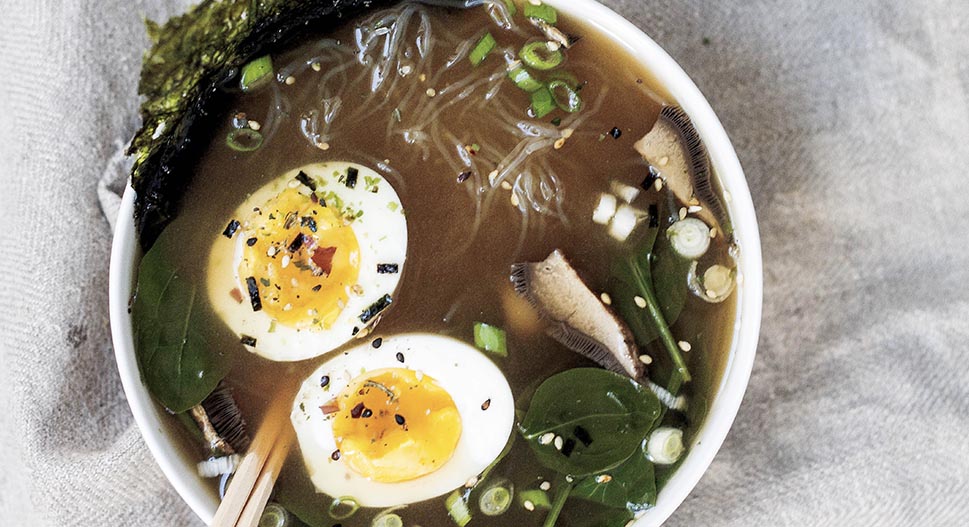
No one likes getting sick. Yet, when winter comes around it’s just something we have to deal with, right? Wrong!
Here are five effective ways to boost your immune system so that you can fend off colds and flu.
-
Strengthen your gut
The microbes in your gut not only help your body digest food, but they also help regulate your metabolism and your immune system. In fact, almost seventy percent of your immune system is in the gut.
Eating fermented food (think bio-live yogurt, miso, kimchi, kefir, sauerkraut) popping a probiotic or increasing dosage if you are already on one boosts the level of good bacteria in your gut. Some high grade protein powders also include added probiotics.
The good bacteria in probiotics influence your body’s T cells, the crucial white blood cells that help power your immune system. They also help reduce inflammation which prevents infection.
Practical Tip:
When you start feeling run down – reach out for an extra boost of probiotic rich food.

-
Raise your vitamin D levels
Super nutrient Vitamin D not only strengthens your bone, dampens inflammation but also slays colds. Recent research has shown that people with low vitamin D levels are 36% more likely to catch a cold than those who are not.
The reason for this is that vitamin D helps your body produce a protein called cathelicidin that fights bacteria. As it’s the sunshine vitamin and most of us don’t get enough of that over winter its recommended to take a supplement over the winter period.
Practical Tip:
In my clinical experience 1000IU of D3 a day during autumn and winter is sufficient to maintain good vitamin D levels.
-
Eat an anti-inflammatory diet
Studies have shown that a high intake of simple sugars decreased white blood cell production buy up to 50%. Eating a diet based on whole foods and loading up on antioxidant rich vegetables and fruit will boost your overall health and help protect you from other viruses and infections.
On the other hand, a diet that is high in refined foods and sugars will dramatically decrease your immune function.
Practical Tip:
Feed your body nutrients not empty calories… and this is especially true when you are about to get the flu or are already sick.

-
Reach for zinc
While vitamin C should be part of your winter regimen (think citrus fruit and fresh veg and fruit) the other nutrient that can help curb cold symptoms fast is zinc.
Research has shown that zinc (found in fish, poultry, legumes, nuts and seeds) can also help shorten the duration of a cold by a few days. That’s because it has powerful immune-boosting and protective effects and studies suggest that it helps stop the replication of a cold’s cell.
Practical Tip:
Reach for 15 – 25mg of zinc a day when you start feeling run down for a short-term bout (1 -2 weeks max). Remember with nutrition and particularly supplements, more is not better. Long term use of zinc can lead to a copper imbalance. Interestingly, food sources that are high in zinc are naturally balanced in zinc and copper. How cool is nature?
-
Sleep some more
Getting enough sleep is crucial for a cold-free winter and also vital for a speedy recovery if you have one. A lack of sleep leads to an increase in the body’s level of cortisol, a stress hormone that can take a roll on your immune system. Lowering your levels of cortisol increases your immune response.
Practical Tip:
Don’t sacrifice sleep, even for exercise. Aim for at least seven hours a night and if you don’t get that then try to have a nap.

Next up
What is the flexitarianism diet and should I try it?
References
- Batatinha H, Biondo L, Lira F, Castell L, Rosa-Neto J. 2018. Nutrients, immune system and exercise. Where will it take us? Nutrition 61: 151
- Chandra R. 2003. Nutrient regulation of immune function. Forum Nutr 56; 147 – 148
- Karacabey K, Ozdemir N. 2012. The Effect of Nutritional Elements on the Immune System. J Obes Wt Loss Ther 2:152
- Williams N. 2010. Probiotics. Am J health Syst Pharm 67; 449 -458





























































